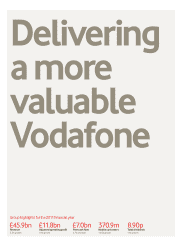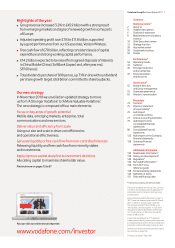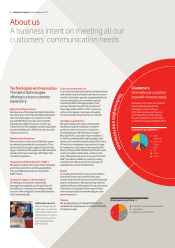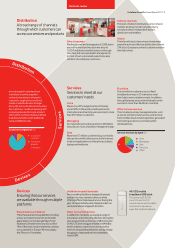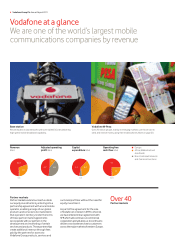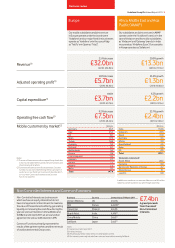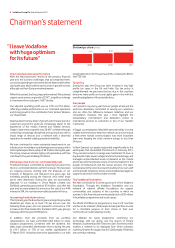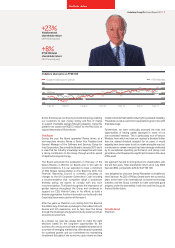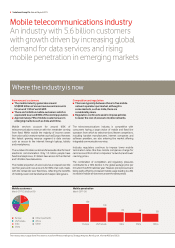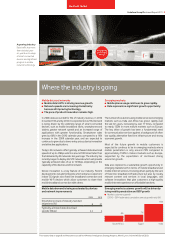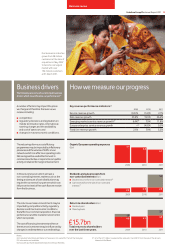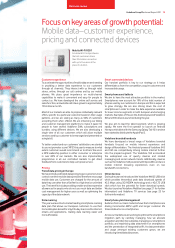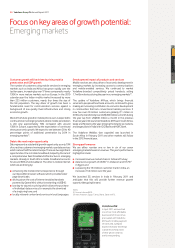Vodafone 2011 Annual Report Download - page 12
Download and view the complete annual report
Please find page 12 of the 2011 Vodafone annual report below. You can navigate through the pages in the report by either clicking on the pages listed below, or by using the keyword search tool below to find specific information within the annual report.Chief Executive’s review
Financial review of the year
We have performed well this year, combining a better
operational performance with good strategic progress.
Organic service revenue growth improved during the year,
with a strong result from emerging markets and signs of
renewed growth in some parts of Europe.
Customers have adopted data services in increasing numbers,
as smartphones proliferate and the tablet market begins
to take off. Our network investment is becoming a key
differentiator, as we are leading the migration to smartphones
in most of our European operations. Through this and our
continued stronger commercial focus, we are growing our
market share again in most of our markets.
However, markets remain competitive and the economic
environment, particularly across southern Europe, is
challenging. We continue to keep a tight rein on costs
and working capital, allowing us to maintain our levels
of investment while again delivering a strong free cash
ow performance.
Group revenue for the year was up 3.2% to £45.9 billion, with
Group service revenue up 2.1%(*) on an organic basis and up
2.5%(*) in Q4. Group EBITDA margin fell 1.1 percentage points,
reecting continuing weakness across southern Europe,
higher growth in lower margin markets, and the increased
investment in migrating customers to higher value
smartphones. As a result, EBITDA fell 0.4% year-on-year.
Group adjusted operating prot rose 3.1% to £11.8 billion, at
the top end of our guidance range after allowing for currency
exchange rate movements and despite the additional costs
incurred by Verizon Wireless’s iPhone launch. The main
drivers were good growth in the Africa, Middle East and Asia
Pacic region (‘AMAP’) and a strong performance from
Verizon Wireless.
We recorded impairment charges of £6.1 billion relating to
our businesses in Spain, Greece, Portugal, Italy and Ireland
which were primarily driven by higher discount rates given
sharply increased interest rates. The impairment in Spain
represented approximately half of the total.
Free cash ow was £7.0 billion, at the top end of our medium-
term guidance as a result of our continued nancial discipline
and a strong working capital performance. Capital expenditure
was £6.2 billion, broadly at on last year and in line with our
target, as we focused on widening our data coverage and
improving network performance.
Adjusted earnings per share was 16.75 pence, up 4.0% on last
year, reecting higher protability and lower shares in issue
as a result of the ongoing £2.8 billion buyback programme.
The Board is recommending a nal dividend per share of
6.05 pence, to give total dividends per share for the year of
8.90 pence, up 7.1% year-on-year.
Europe
Organic service revenue in Europe was down 0.4%(*) during the
year and down 0.8%(*) in Q4. This represents a good recovery
on last year (-3.8%)(*) and is the result of two different trends:
the more stable economies of northern Europe (Germany, UK,
Netherlands) were up 2.7%(*), while the rest of Europe was
down 2.9%(*) as a result of the ongoing macroeconomic
challenges. Data revenue growth continued to be strong, but
was offset by continued voice price declines and cuts to mobile
termination rates (‘MTRs’).
Organic EBITDA for Europe was down 3.7%(*) and the EBITDA
margin fell 1.7 percentage points as a result of the decline in
revenue, ongoing competitive activity and higher commercial
costs as we accelerated smartphone adoption.
AMAP
Organic service revenue growth in AMAP was 9.5%(*),
accelerating through the year to a level of 11.8%(*) in Q4. Our
two major businesses, India and Vodacom, reported growth of
16.2%(*) and 5.8%(*) respectively. Our performance in India has
been driven by increasing voice penetration and a more stable
pricing environment. In South Africa, Vodacom continues to be
highly successful in promoting data services.
Organic EBITDA was up 7.5%(*) with EBITDA margin falling 0.6
percentage points(*). The two main factors behind the margin
decline were the adverse impact from higher recurring licence
fee costs in India and the change in regional mix from the
strong growth in India.
Verizon Wireless
Our US associate, Verizon Wireless, has continued to perform
strongly. Organic service revenue was up 5.8%(*) and EBITDA
was up 6.7%(*), with good growth in customers and strong data
take-up. In Q4, Verizon Wireless launched a CDMA version of
the iPhone, ending the exclusivity of its main competitor. Our
share of prots from Verizon Wireless amounted to £4.6 billion,
up 8.5%(*).
Delivering a more valuable Vodafone
In November 2010 we announced an updated strategy,
designed to build on the progress made during my rst two
years as CEO. There are four main elements to the strategy to
build a more valuable Vodafone:
■Focus on key areas of growth potential;
■Deliver value and efficiency from scale;
■Generate liquidity or free cash flow from non-controlled
interests; and
■Apply rigorous capital discipline to investment decisions.
I am pleased to say that we are making good progress in
each area.
“We are gaining or holding market share in
most of our major markets and are leading our
competitors in the drive to migrate customers
to smartphones and data packages.”
10 Vodafone Group Plc Annual Report 2011


